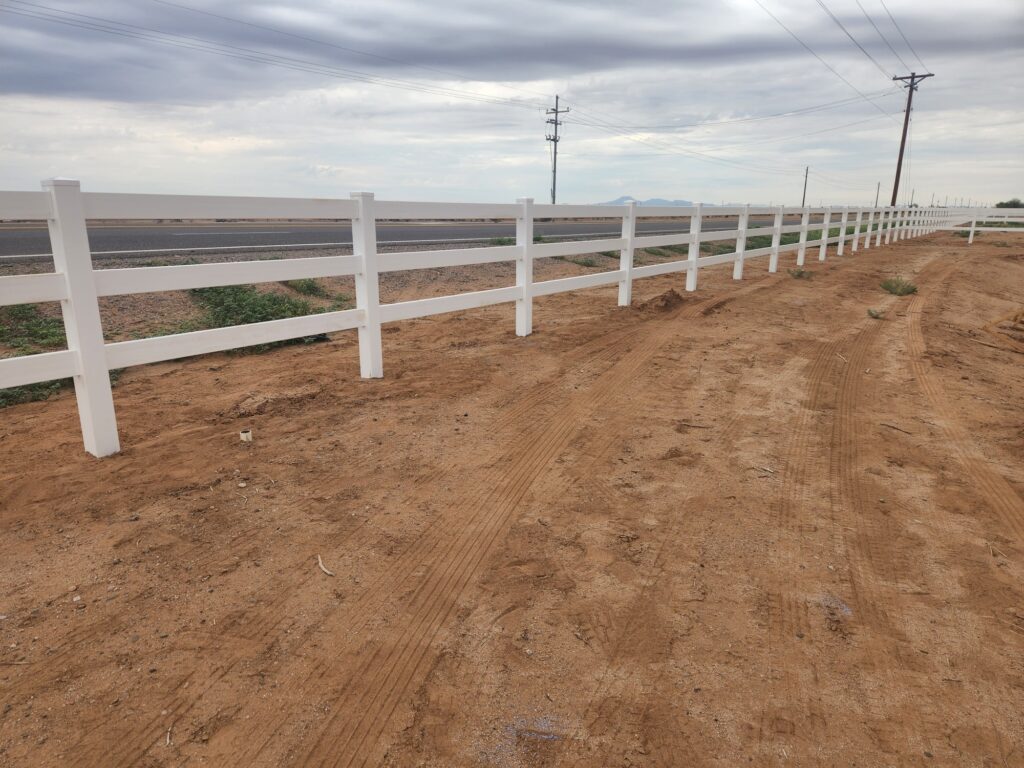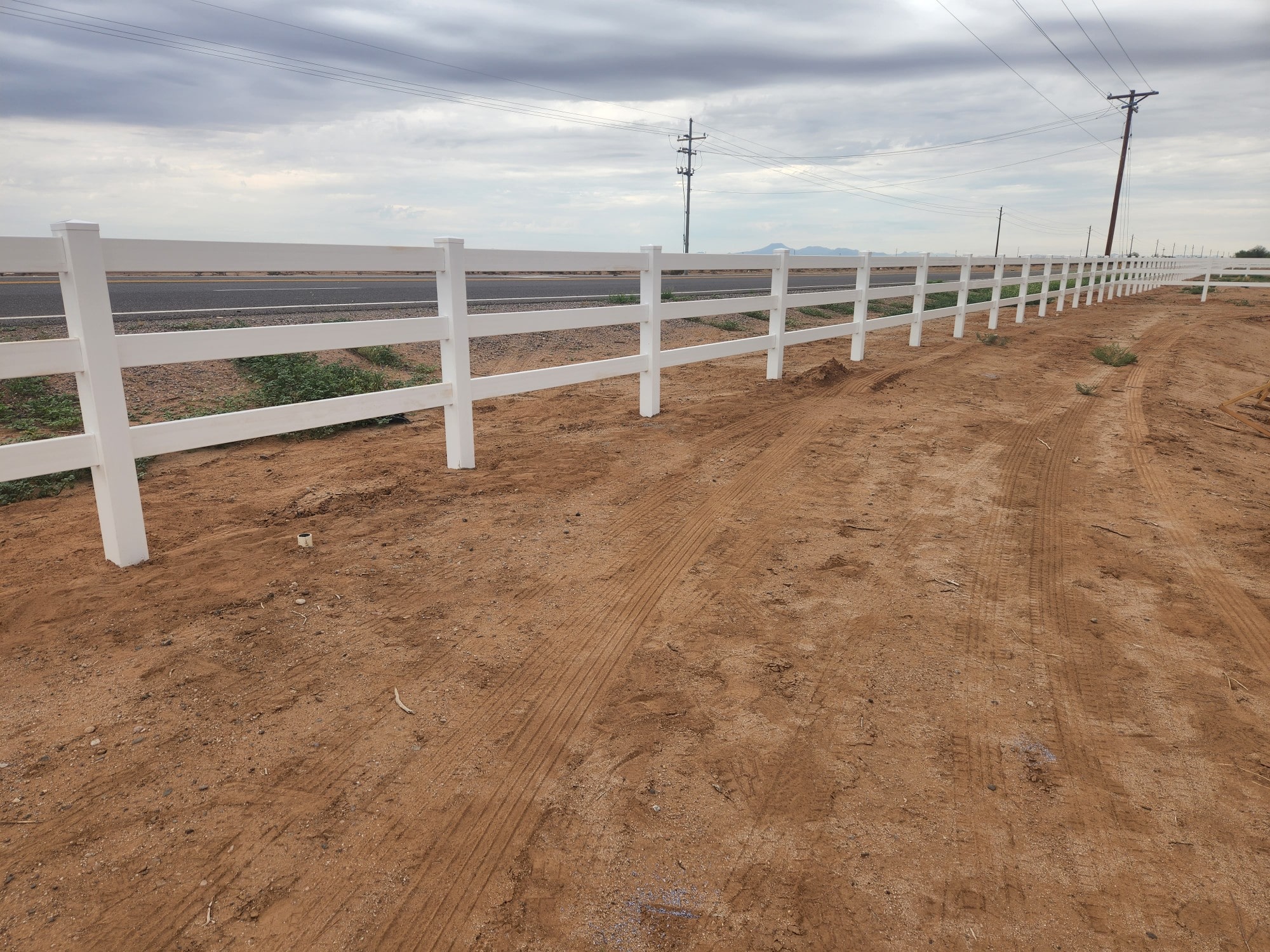
Vinyl fencing is often touted as a low-maintenance, durable alternative to traditional materials like wood or metal. But one question homeowners frequently ask is whether vinyl fencing can truly handle extreme weather. From scorching heat to freezing temperatures, high winds to heavy snow, vinyl fences face a wide array of challenges depending on the location. In this blog, we’ll explore how vinyl fencing stands up to different weather conditions and whether it’s a good choice for areas prone to severe climates.
What is Vinyl Fencing?
Before diving into weather resistance, it’s important to understand what vinyl fencing is. Vinyl fences are made from polyvinyl chloride (PVC), a durable plastic material. This material is resistant to issues like rotting, rusting, or insect infestations, making it an appealing choice for many homeowners. Vinyl fences are also known for their minimal maintenance requirements, which sets them apart from wood and metal fences.
But how does this plastic material stand up to Mother Nature’s extremes?
Vinyl Fencing in Extreme Heat
Resistance to Fading and Warping
One concern homeowners in hot climates might have is whether vinyl fencing can withstand prolonged exposure to high temperatures and intense sunlight. Unlike wood, which can warp, crack, or fade under heat, vinyl fencing is highly resistant to these effects. Modern vinyl fences are designed with UV inhibitors, which help them resist the harmful rays of the sun. This means that even in locations with hot summers and unrelenting sun exposure, the fence’s color will remain vibrant for years.
Thermal Expansion and Flexibility
However, extreme heat can cause some degree of thermal expansion. This means the vinyl may slightly expand when temperatures soar, but this is a normal occurrence and does not compromise the fence’s integrity. In fact, vinyl is flexible enough to withstand minor movements, unlike wood that can split or metal that can become warped in the sun.
If you live in an area known for extreme heat, proper installation techniques can further reduce the risk of any issues related to thermal expansion.
Vinyl Fencing in Freezing Temperatures
Potential for Brittleness
While vinyl fencing holds up well in hot weather, extremely cold temperatures present a different challenge. In frigid climates, vinyl can become more brittle. This brittleness increases the risk of cracking if the fence is subject to impact—such as a heavy branch falling on it or a snow plow brushing against it.
However, it’s important to note that cracking typically only occurs under extreme circumstances. High-quality vinyl fences are engineered to handle cold weather better than earlier models, but for those in particularly harsh winter climates, reinforcing your fence posts and ensuring that no heavy objects can fall on the fence during winter can help.
Protection Against Snow and Ice
Heavy snowfalls can pile up against your vinyl fence, but unlike wood fences that can rot due to moisture, vinyl is impervious to water damage. Snow and ice will not warp or degrade the material, and the fence will remain structurally sound once the snow melts. Just make sure to avoid hitting the fence with shovels or snow blowers, as the brittleness caused by extreme cold could lead to damage.
Vinyl Fencing in High Winds
Wind Resistance
If you live in a region prone to high winds, you might wonder whether vinyl fencing can withstand these conditions. The good news is that vinyl fences are highly durable when properly installed. Most vinyl fences can withstand wind speeds of 100 miles per hour or more, making them an excellent option for windy locations.
The key to ensuring wind resistance lies in the installation. Posts should be secured deeply into the ground, and the panels should be tightly fitted to prevent rattling or shaking. For areas that experience frequent storms or hurricanes, reinforcing the posts with concrete or installing specialized wind-resistant designs can further enhance the fence’s durability.
Flexibility During Storms
Vinyl’s natural flexibility also comes into play here. Unlike rigid materials like wood or metal, vinyl has a bit of give, which allows it to absorb some of the force from high winds. This flexibility reduces the likelihood of snapping or breaking during intense storms. However, if a significant object such as a tree or a large branch hits the fence, there is still a risk of damage.
Vinyl Fencing and Heavy Rain or Flooding
Moisture Resistance
One of the best features of vinyl fencing is its resistance to moisture. Unlike wood, which absorbs water and can rot, or metal, which can rust, vinyl is impervious to water. This makes it an excellent choice for regions that experience heavy rainfall or frequent flooding. The fence will not degrade when exposed to wet conditions, and once the water recedes, the fence remains intact without needing repairs.
Proper Drainage and Installation
While the vinyl itself won’t suffer from moisture, the area around your fence should have proper drainage to avoid water pooling around the fence posts. Over time, waterlogged soil can cause the posts to become unstable, which could compromise the entire fence. Ensure that your fence is installed with proper drainage techniques to avoid long-term issues.
Vinyl Fencing in Hailstorms
Impact Resistance
While vinyl fencing is designed to withstand most weather conditions, hail presents a unique challenge. Large, hard hailstones can dent or crack vinyl fences, especially if the fence has become brittle due to cold temperatures. Although modern vinyl fences are made with improved impact resistance, no material is entirely immune to hail damage.
If you live in an area prone to hailstorms, you may want to inspect your vinyl fence regularly after storms to check for any cracks or damage. Prompt repairs can prevent further issues from arising.
Conclusion: Can Vinyl Fencing Handle Extreme Weather?
Vinyl fencing is a durable, low-maintenance option that performs well under a variety of extreme weather conditions. Its resistance to fading, rotting, and rusting makes it an ideal choice for many climates. In hot, humid, or rainy environments, vinyl fencing remains resilient with minimal upkeep. While it can become brittle in extremely cold temperatures, proper installation and care can mitigate this issue.
For those in areas prone to high winds or heavy snowfall, vinyl’s flexibility and resistance to moisture make it a strong contender. As long as you take steps to install the fence correctly and inspect it regularly, a vinyl fence can offer long-lasting protection and beauty for your property, no matter what Mother Nature throws your way. Contact us today for more information or to get a free consultation.
